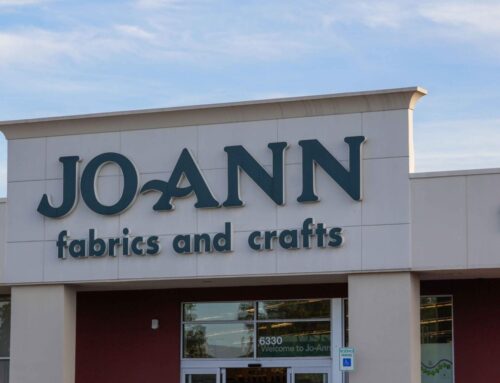What do truck drivers and stray pets have in common?
They’re both helping neighborhood resident Christopher A. Richey work toward one of his goals: becoming a millionaire.
The 35-year-old Richey offers two services with which we’re all familiar, but they seem offbeat as far as business ventures go. His company PetFind provides the pet registration tags that reunite lost animals with their owners; and SafetyNet Inc. provides truck and bus companies with “How Am I Driving?” bumper stickers so they can monitor their drivers.
Sound a little quirky? Not to Richey, who says he’s basically a computer man.
“It’s all database management, but very unusual niches within that concept,” he says.
Several years ago, Richey quit a stable job as an Investment banker to go into business for himself.
At first, he lost money. His family struggled. He put in long hours and he says customers didn’t take him seriously.
But today, he has hundreds of clients and recently has begun a third company, Pan-American Access, which translates computer software from English to foreign languages.
He’s making enough money that his wife, Julie, recently quit her job in public relations to stay home with their 10-month-old daughter. She too is pursuing entrepreneurial hopes, trying to turn her talents as a mosaic artist into a business.
“Entrepreneurs breed other entrepreneurs,” says neighborhood resident Jerry White, director of SMU’s Caruth Institute of Owner-Managed Business.
“Our whole area is rejuvenating. There’s a certain energy here. A community of entrepreneurs provides role models for other entrepreneurs.”
Fertile Ground
Our neighborhood provides fertile ground for mom-and-pop businesses, says Stephen Garvin, who helped found and is past director of the East Dallas Chamber of Commerce’s annual small business awards.
The chamber defines a small business as an independent, privately held company with gross revenue between $100,000 and $10 million.
“We’re more an eclectic area,” Garvin says. “The people here are a little more creative. They fall less into the stereotype of keeping up with the Joneses. They do things differently, and that is why they’re successful.”
Garvin, a 35-year-old Forest Hills resident, says neighborhood people support smaller companies because they like the diversity and spice mom-and-pop businesses bring to our community.
Garvin also has been bitten by the entrepreneurial bug.
In April, he and his wife bought the beauty parlor where they and their three sons have had their hair cut for years. The salon, now called Complete Beauty (3302 N. Buckner), will be renovated and renamed in January, Garvin says.
This is one of several business ventures for Garvin, who is the first vice president of Southwest Securities, a local investment firm. Garvin says he has personally invested in a handful of entrepreneurial efforts around the Metroplex, including a restaurant, a hospice and a company that makes electrical wire.
There are many things to consider when starting a successful small business, Garvin says. Small business owners have to learn government regulations, find an insurance policy, and set up the nitty-gritty things necessary to operate, such as phone and fax systems.
“An entrepreneur has to wear every hat,” Garvin says. “He has to know something about finance, something about marketing, something about his product, and he has to know how to be a manager.
“You’ve got to be able to keep your costs down. You’ve got to be able to keep people happy – both your employees and your customers. It’s not an easy task.
“You can’t afford to have an accounting department or a customer service department or a shipping department. It’s all done by one or two people.”
Finances can be a big obstacle, Garvin says.
“It’s easy to go into business, but it doesn’t mean it will make a profit or survive,” he says. “One of the critical aspects of a small business is capital. You really have to have a cost control on your business so you have enough capital to last you through the skinny times while you build.”
Fat Rewards
Richey made it through the skinny times and is now reaping fat rewards.
He started SafetyNet in 1991. The company was unprofitable until 1994, but is now doing well.
“I’m hoping SafetyNet will do three quarters of a million dollars (in revenue) this year and a million dollars next year,” says Richey, who has an MBA from Rice University.
Richey considered several business options before starting SafetyNet, but says many of his ideas needed too much money up front or had too much existing competition.
Richey looked into restaurants and retail outlets, but decided to try bumper stickers after his partner; who is no longer with the company, saw a similar product while on a road trip.
“I probably looked at hundreds of businesses,” he says. “This was the one left standing in terms of viability.”
Richey raised $250,000 from investors, mostly friends, family and fellow business school graduates, he says.
Tapping friends and family is how most entrepreneurs acquire start-up funds, Garvin says. Some also use their life savings or take out loans, he says.
Richey used his start-up money to purchase bumper stickers, lease an office space and set up his computer system. He started with two other people and now has 13 employees.
Today, there are approximately 75,000 vehicles adorned with SafetyNet bumper stickers, Richey says.
“You know you’re a viable company when you drive around and see your service,” says wife Julie. “People are using it that don’t even know you.”
Some of SafetyNet’s customers include Dallas Public Schools, Sears, Frito-Lay, Coca Cola, Greyhound and the New York City Transit Authority.
SafetyNet and its divisions, Safest-1 and SafeBus, use computers to register complaints and comments from people who call the 800 number listed on “How Am I Driving?” bumper stickers. Once the information is obtained, the company provides safety reports to its clients.
Once the ball was rolling with SafetyNet, PetFind evolved, Richey says. All it took was an adaptation of software, he says. Richey says he got the idea after taking in several stray animals and then finding it difficult to track down their owners even when the animals had tags.
PetFind uses computers to keep comprehensive records about owners, including work and cellular phone numbers, so they can be reached easier when lost pets are found. When people find pets with PetFind tags, they can call the company, and PetFind employees do the footwork.
PetFind also started out small. The company began in 1993 as an animal lost and found service independent of the City, but scored a coup in 1995 when it won the City’s animal registration contract, outbidding the City’s existing animal control division and the SPCA of Texas. The contract was awarded to PetFind as part of a City effort to privatize some of its services, Richey says.
The three-year, $546,000 contract began in May 1995. The amount of money Richey ultimately makes depends on how much sales tax he generates with tag registrations. He is currently processing 60,000 to 70,000 tags a year, he says, which brings in between $1.2 to $1.6 million for the City.
How did Richey do it?
“It took face-to-face marketing,” he says. “Don’t be afraid to go after the biggest possible company out there. They may be unhappy with their current vendor. Unless you’re willing to have a few doors slammed in your face, you’re not going to be able to land those customers.
“Don’t ever get complacent. Once you’re established, competitors will come after you like you went after them. Don’t forget what it took to get there.”
Tired of the Grind
Forty-year-old Chuck Walton also is a neighborhood entrepreneur. But unlike Richey, he didn’t attend business school.
He didn’t even plan to be his own boss, but this former salesman says he grew tired of the suit-an-tie corporate life.
“I realized I wouldn’t get rich working for someone else,” he says.
Eleven years ago, he heard that a small plant nursery was for sale in our neighborhood, and he saw his chance to work for himself.
He was familiar with the nursery because his mother had shopped there when he was a child. He also had mowed lawns and worked at other nurseries in high school to make extra money and had majored in biology in college. That and his sales experience was the extent of his entrepreneurial preparation.
Today, his nursery – Walton’s Garden Center, located across the street from the Dallas Arboretum at 8642 Garland – is thriving.
The nursery doubled its sales eight months after Walton took over and is now double its original size. Walton generated his largest revenue ever last year, he says.
“If we stay at the same pace, we’ll do a million (dollars in revenue) this year,” he says.
Walton’s business has grown from employing one to nearly 20 people, and this summer, he finished renovations that enlarged the nursery’s indoor retail portion from 400 to 1,000 square feet.
Walton also has expanded into landscaping and construction and attracts many neighborhood clients. The neighborhood is the backbone of his business, and his location is the key to his success, he says.
“I would say 70 percent of our retail business comes from the neighborhood,” Walton says. “The bigger the Arboretum gets, the more income we generate. People come out of the Arboretum and into our nursery. It helps us as far as our exposure is concerned.”
Walton says he has learned how to run a business by asking for advice from others and through trial and error.
“I didn’t have any accounting or business classes in college,” he says. “I think my greatest strength is common sense.
“I’m not a very religious man, but you have to have God on one side and a little bit of luck on the other.”
Every Rose Bush Has Its Thorns
Walton enjoys controlling his destiny and being able to wear shorts to the office, but he says owning a plant nursery hasn’t been a bed of roses.
Entrepreneurship isn’t a get-rich-quick scheme, he says.
Walton gives 12 hours a day to his business and has worked six weeks at a time without taking a day off, he says. Nursing his business has taken away time from his family and allows for little relaxation, he says.
But he says he finds satisfaction in the artistic side of landscaping and in the pleasure he feels when someone else like what he has built with his own hands and imagination.
He says the real rewards of entrepreneurship will come later in life.
“My benefit is going to be 10 to 15 years down the road,” he says. “When I want to retire, I’ll have something built up.”
Like Walton, Richey’s time is scarce. But he says being his own boss allows him to schedule his business commitments around his child and wife.
He says he is also happier now because he likes what he’s doing.
If you’re starting a business just to make money, the strain of entrepreneurship will probably overwhelm you, Richey and Walton say. You have to do something you enjoy, they say.
“Never lose your sense of humor,” Richey says. “When you don’t think it can get worse, you can have another bad day. Expect to work much harder than you ever did before, but it’s far more rewarding.”
The Personal Touch
In a world of Wal-Marts, small businesses survive by providing a personal touch, Walton says.
Most business for Walton’s Garden Center is generated through word-of-mouth, he says. You have to build a good reputation in the neighborhood to stay in business, he says.
“We try to do a total package for somebody and take care of all their needs,” Walton says. “The customer is my boss.
“If you do good work and somebody trusts you, they’re going to tell someone else. You always have to treat your customers they way you want to be treated. I always put myself in the customer’s shoes.”
The same applies to employees, Richey says.
In a business that relies on a handful of people to make it work, those people have to be happy and driven to make the business successful, Richey says.
Making the human side of business is the hardest part of entrepreneurship, he says.
“In corporate finance, you’re taught to look at assets and balance sheets,” Richey says. “But when you’re the CEO of a company, you don’t look at it as how many widgets can you make.
“The people behind the numbers are what you need to focus on.”





